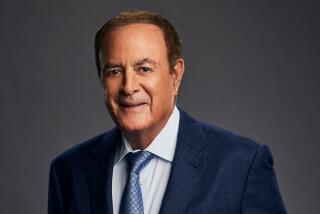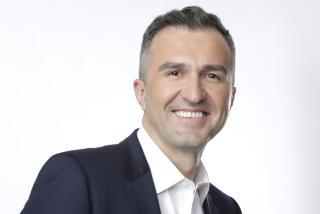ABC’s Lavish Spender Has Changed His Ways
- Share via
NEW YORK — Five years ago, ABC’s “Wide World of Sports” toasted its 20th year at the Waldorf-Astoria. This year, for its 25th anniversary, tuxedos gave way to sport jackets and the gala banquet was pared to trays of finger food. The party was held in an ABC studio.
“There are periods when you have to have not only real austerity, but symbolic austerity,” Roone Arledge said. “This is one of those periods.”
In 2 1/2 decades at ABC, Arledge, president of ABC News and nominal head of ABC Sports, justly earned a dual reputation as big thinker and big spender.
But, he insists, the times make the manager, and today’s times are economically lean for all three major television networks, but particularly for ABC. Under the network’s new owners, Capital Cities/ABC Inc., staff has been cut, spending reduced and management streamlined.
Arledge, the former big spender, says he’s happy with his new bosses.
“They’re obviously cost-conscious, as we all are,” Arledge said in an interview. “I don’t think it’s been at a cost of very much. I’ve always managed according to the needs of the company. Right now, the needs of the company are to make every dollar count.
“But there was a time when the need was to invest and spend, and the results were very good.”
Coping with a network TV environment that places the bottom line over the finish line is not Arledge’s choice, but it is his reality. For the first quarter of 1986, Capital Cities/ABC reported a slim operating profit of $2 million on revenues of just over $900 million. Management attributed the network’s share of the lackluster performance to soft advertising demand, poor performance in prime time and money-losing sports deals, most notably in baseball and football.
Down the road, at Calgary, is the 1988 Winter Olympics, for which ABC is paying $309 million. But ABC made its bid in early 1984, when the TV sports carousel still had gold rings. Some industry analysts now suggest the glittering prize of television rights is fool’s gold in today’s market, giving rise to rumors that ABC is seeking to unload parts or all of the 1988 Winter Games.
“That’s not a true story,” Arledge said. “A lot of people called me asking about it. In fact the first person to call was Peter Jennings just before his ‘World News Tonight’ broadcast.”
Recognizing its difficulties, ABC eliminated 615 positions in August 1985, half a year before Capital Cities Communications Inc. took over. Since the new management arrived in January, an additional 600-700 positions have been trimmed throughout the ABC system, including 75 at ABC News.
Arledge oversaw the elimination of those news jobs a month ago, reducing the payroll to 1,100 staffers, fewest among the three networks. Arledge and his news executives initiated the cuts in a preemptive move before Cap Cities could feel compelled to act.
Arledge said the belt-tightening was partly a reflection of network TV’s troubled times and partly Cap Cities’ philosophy. It is a philosophy that he accepts, certainly for now.
In the 1960s, Arledge spent lavishly and created new programs in sports that gave ABC an innovative image except in prime time and news, where it was rated third. ABC became the Olympic network, and, because its prime-time schedule was in shambles in the late ‘60s, Arledge was able to persuade management to gamble on “Monday Night Football.”
“Sometimes adversity can be a good thing,” Arledge said.
When Arledge became president of ABC News in 1977, he inherited a third-ranked operation in ratings, personnel and prestige. His response was to spend off the air to improve the product on the air. By offering higher salaries, he lured producers and reporters from CBS and NBC.
At the same time, ABC News invested in satellite equipment that helped make the new “Nightline” and “This Week With David Brinkley” pioneering programs. Over time, ABC News gained stature and, at last, made money, although News spokesmen declined to specify when they first turned a profit.
But was it also becoming wasteful and spending too much?
“All organizations have the tendency to get fat at times,” Arledge said. “But that was not true in our case. ABC News had to build from the ground up. We had to get the attention of people who hadn’t wanted to work at ABC News.”
At a recent meeting with security analysts, Thomas Murphy, chairman of Capital Cities/ABC, said, “Even if we were not experiencing any problems with ratings and advertising demand, we would feel that it is necessary to reduce ABC’s cost structure. . . . If ABC is to continue to be a strong factor in this business, it must become a leaner, nimbler organization.”
Later, Murphy added: “We cannot--and will not--let ABC get out of shape again in the future, just because it can afford a richer diet.”
By all accounts, Arledge is a good soldier marching to the same drumbeat as his bosses. He feels he has the support of Cap Cities, which has called him an asset and has let him run news without any significant interference.
“The press tends to form images and never let them go away,” Arledge said. “The image of Cap Cities as penny-pinchers will haunt them long after it has served its purpose. They’re not unwilling to be portrayed that way because that’s the need right now, but that’s not to say that’s all there is.”
More to Read
The biggest entertainment stories
Get our big stories about Hollywood, film, television, music, arts, culture and more right in your inbox as soon as they publish.
You may occasionally receive promotional content from the Los Angeles Times.










